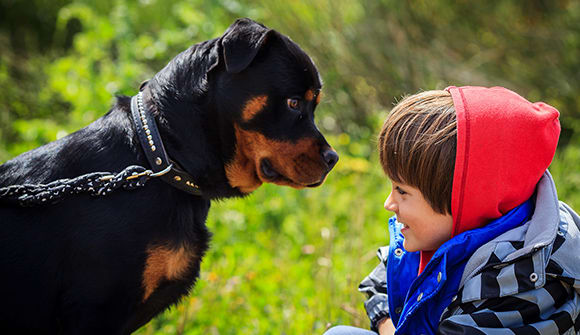Dog bite prevention
Babies and toddlers are most common victims.
Article Author: Juliette Allen
Article Date:

Dogs are members of the family, which means they’re often invited to family cookouts, parties and other social gatherings. Despite all those Instagram photos of dogs donning human clothing, health and child safety experts remind the public that dogs are, in fact, animals, and even the friendliest Fido can bite.
Reading a dog's body language
In 2023, 437 children and teens under 18 were seen in Baptist and Wolfson Children’s Emergency Centers for dog bites.
“Animals can’t talk to us, so it’s important to read their body language and other signs to help prevent a bite,” said Jessica Winberry, prevention coordinator for Safe Kids Northeast Florida, which is led by THE PLAYERS Center for Child Health at Wolfson Children’s Hospital. “Most animals give many warnings before they bite a person. It’s important to create a safe space for your dog when you have visitors, so pets have a place to retreat when they need a break.”
Dogs can be unpredictable
John Draus, MD, medical director of Wolfson Children’s Porter Family Children’s Trauma Center and division chief of Pediatric Surgery for Nemours Children’s Health, Jacksonville, said all children are vulnerable to dog bites, but the most common ages of victims are between infancy and 2 or 3 years old.
Because toddlers are usually around the same height as a dog’s face, Dr. Draus typically sees injuries to the face and neck areas.
“Dogs are part of the family, but they’re animals first and foremost,” he said. “Most kids don’t think a dog will hurt them, but it happens. Parents should protect their children from unknown or potentially aggressive dogs. I wouldn’t leave an infant or small child unattended with any dog, even the family dog. Like all animals, they can be unpredictable. Some of the injuries we see are severe and leave lifelong scars and disfigurement. It’s not worth the risk.”
Watch for these warning signs
According to the American Society for the Prevention of Cruelty to Animals (ASPCA), warnings signs a dog may be feeling anxious, afraid or aggressive and could be about to bite include:
- Puffed up fur on back or tail
- Tail straight up or wagging
- Stiff, straight-legged stance
- Low growl or baring teeth
Ways to avoid a dog bite
Safe Kids Northeast Florida urges parents and children to follow these Dos and Don’ts:
DO
- Ask for permission from the dog’s owner before reaching to touch it.
- Offer the dog your hand to sniff and pet the side or chest of the dog rather than its head.
- Stay away from loose, unsupervised dogs that are wandering around.
- If a dog that seems aggressive approaches you, slowly back away or “act like a tree” by folding your arms, standing still and avoiding eye contact.
DON’T
- Leave a baby or small child alone with a dog, ever.
- Tease a dog by pretending to take its toys or treats, or pretending to hit or kick it.
- Bother a dog when it is eating, sleeping or in its crate.
- Pull a dog’s tail or ears, or climb or ride on a dog.
- Run away from an aggressive dog. The sudden motion may startle it.
Keep your kids injury-free
Safe Kids Northeast Florida, led by THE PLAYERS Center for Child Health, is dedicated to child injury prevention and offers a range of programs to keep your kids injury-free. To learn more call 904.202.4302.
Source: ASPCA



